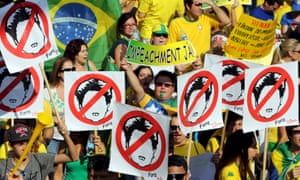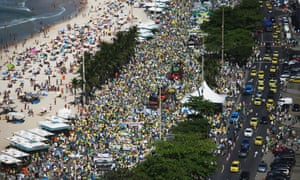Demonstrators take on leaders: ‘We don’t have politicians – we have thieves’

Demonstrators attend a protest against Brazilian president Dilma Rousseff, in São Paulo’s financial centre. Photograph: Paulo Whitaker/Reuters
Tens of thousands of Brazilians took to the streets in cities across the country on Sunday, to protest against President Dilma Rousseff.
Angered by a massive, unfolding corruption scandal, an economy mired in recession and harsh austerity measures, many of the protesters called for the president’s impeachment.
In São Paulo, an anti-government event drew around 135,000, according to Datafolha, a polling institute. Though significant, the numbers were down on a similar event in the city in March this year, which attracted 210,000.
In Brasília, police numbered the crowd at around 25,000. Demonstrations took place in more than 200 cities, including Rio de Janeiro, Belo Horizonte and Salvador.
In Rio de Janeiro, thousands marched along Copacabana’s Avenida Atlântica, many dressed in the yellow and green of the Brazilian football team. The crowd followed six mobile sound-systems, each commandeered by a different protest movement, loudly broadcasting a mixture of anti-government speeches and music.
Tens of thousands of Brazilians took to the streets in cities across the country on Sunday, to protest against President Dilma Rousseff.
Angered by a massive, unfolding corruption scandal, an economy mired in recession and harsh austerity measures, many of the protesters called for the president’s impeachment.
In São Paulo, an anti-government event drew around 135,000, according to Datafolha, a polling institute. Though significant, the numbers were down on a similar event in the city in March this year, which attracted 210,000.
In Brasília, police numbered the crowd at around 25,000. Demonstrations took place in more than 200 cities, including Rio de Janeiro, Belo Horizonte and Salvador.
In Rio de Janeiro, thousands marched along Copacabana’s Avenida Atlântica, many dressed in the yellow and green of the Brazilian football team. The crowd followed six mobile sound-systems, each commandeered by a different protest movement, loudly broadcasting a mixture of anti-government speeches and music.

Dilma Rousseff stares down the spectre of impeachment: 'The question is arithmetic'
Angered by a massive, unfolding corruption scandal and an economy mired in recession and harsh austerity measures, many of the protesters called for the president’s impeachment.
Police said around 25,000 protested in the capital, Brasília. Demonstrations took place in more than 200 cities, including São Paulo, Belo Horizonte and Salvador.
According to the newspaper O Folha de São Paulo, which cited anonymous government sources, around 200,000 took part in the marches, excluding those in Rio de Janeiro and São Paulo – fewer than the government had feared.
In the shade of one of the few trees along the route, Marcia Regina, 55, a teacher from Rio’s Northern Zone, took a break from hammering banners bearing anti-government messages on to wooden poles.
“I can’t stand being in a country where I have to pay such high taxes to get nothing whatsoever in return,” she said. “In our health system, we are treated like wild animals. In terms of public safety, we are just treated as statistics. Don’t even talk to me about education. They think we are all stupid.”
With families and friends snapping selfies and socialising under a baking mid-winter sun, the demonstration was good-humoured. But the participants were unmistakably angry. Atop one of the sound systems, a man dressed as Captain America reminded the crowd that “this is not Carnival”.
João-Luiz Garcia, 31, an engineer, gathered signatures for a petition to force congress to debate anti-corruption measures. A voter for Rousseff’s predecessor, Lula da Silva, Garcia said he had been sold a dream that Brazil could change.
“What happened was the opposite. Economic power became even more concentrated,” he said. “The people close to the government benefited much more than the rest of the population.”
In terms of public safety, we are treated as statistics. Don’t talk to me about education. They think we are all stupidMarcia Regina
A minority of the protesters demanded military intervention if the president refused to stand down. Angela Tenorio, 62, a doctor whose televised tirade against the inadequacies of the public health system went viral in 2012, attended the march holding a banner with a picture of Rousseff as the Terminator, under the slogan “Exterminator of the Future”.
“I don’t just want her out of power,” she said. “I want her out of the country. I want the return of the armed forces, because we don’t have politicians, we have thieves. The political parties are criminal factions. The military have to take care of the country.”
The leftwing Partido dos Trabalhadores (PT) has been in power for more than 12 years. Many of the demonstrators accused it of institutionalising corruption.
Earlier this month, one of the party’s founders, José Dirceu, was arrested, suspected of orchestrating a multibillion dollar bribery scandal at the state oil company, Petrobras.
Over the past year, “Operation Car Wash”, a police investigation into corruption at the oil firm, has resulted in the arrests of dozens of leading industrialists. More than 50 politicians, mainly from the ruling coalition, have been accused of involvement in the scheme.
A criminal investigation has also been opened into former president Lula, over allegations of illegal influence-peddling in the years since he left office.
With the economy expected to contract around 2% this year, inflation nearing 10% and unemployment rising, anger at the country’s political elite is growing.
Protesters march along Copacabana beach in Rio. Photograph: Mario Tama/Getty Images

Brazil elite profit from $3bn Petrobras scandal as laid-off workers pay the price
The president’s approval rating is in single digits, and a recent survey found that two-thirds of Brazilians wish to see her impeached, despite the fact there is no clear-cut legal case for her removal.
The pro-impeachment lobby in congress is short of the votes it needs to initiate proceedings. Over the past week, Rousseff has strengthened her relationship with the senate president, Renan Calheiros, in a move that could help her avoid impeachment.
Raul Gotlieb, 64, an engineer attending the protest in Rio, said he believed demonstrating widespread popular outrage was key to persuading congress to impeach the president.
As to whether the protests received sufficient support, he said the turnout was better than he expected.
“But it’s far less than we should have,” he said. “There should be 40 million people on the streets.”
The Guardian



No comments:
Post a Comment